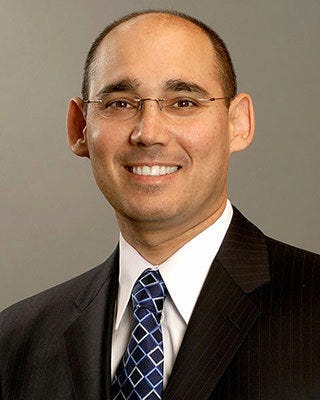Amir Yaron has been through some of the most tumultuous times a central banker could face since he became Governor of the Bank of Israel five years ago. An academic who was a rising star in the field of economics and caught the eye of Israeli officials, first he had to guide the economy through the pandemic, and then as it was ending the October 6 Gaza attack sparked the war that is still ongoing.
This year at the Spring Meetings of the IMF and World Bank, growth forecasts for many countries were downgraded as the potential negative impact of Trump tariffs is widely expected to slow growth and boost inflation - and create such a degree of uncertainty that it slows investment and even consumer spending.
On this front, Yaron is not overly concerned. He notes that even after the IMF’s downgrade, it still sees Israel’s GDP growing 3.2% this year and 3.6% next year—lower than the Bank of Israel's most recent forecasts of 3.5% and 4%, but still on very solid ground.
The Gaza war creates another significant kind of uncertainty for the BOI. Unlike most other central banks, Yaron and his team have to make forecasts based on expectations on when the war will end. A clear example is defense spending that is now a bigger than ever part of the budget forecast, which will get bigger the longer the war continues.
So dive in and hear what Governor Yaron has to say. And get a sense of what it’s like to navigate conventional monetary strategy in a world that is anything but.
Trump places tariffs on Isreal despite stong alliance 00:00:58:09
There's something about to me about that, the dynamic of all that. And if every country is different, but you've set it up like that, it's like what happened? So let me just put it in perspective. The US applied, you know, one formula, which is based on every country's trade surplus vis a vis the US and the 17% that was slated for Israel was derived from that formula. You know, the Israeli government and the US administrations are in talks. They're working on reducing that surplus in a prudent way and in a way that will least impact Israel also. There is some issues about how exactly that surplus is, <how it is> measured, etc., but there's ongoing talks. So that's just regarding the perspective of the US is obviously Israel's greatest ally.
Small impact of tariffs 00:02:25:05
… the direct impact should be vis a vis other countries, more moderate. That's number one. Where we are impacted is the indirect channel. To the extent that tariffs will be imposed globally and we'll have a global reduction, there'll be a reduction in global trade, first of all, reduction in growth that affects us as we are a small open economy that is affected by global trade.
Potentially greater impact through financial markets 00:02:54:07
The other effect is if the stock market persistently stays behind and we are seeing wealth effects decline, particularly in NASDAQ and in the VC area and the VC area is the one that helps fund some of the high tech in Israel. That's another channel that, of course, is affecting Israel. So those are the two, the two the two areas.
Tariffs on Israel and the forecast 00:03:22:07
We've shaved a half percent of GDP growth both for 2025 and 2026. Given the proposed tariffs before, they were sort of laid back to 10% for 90 days. So and a lot of it comes from that indirect channel that I just mentioned. So the let's look at the we're here at the International Andre Fund World Economic Outlook. Actually, you know, here they put out their forecasts overall growth is going to globally you mentioned global growth slowing down.
More Numbers Israel’s Vs the IMF WEO 00:04:47:12
For example, the IMF has put us at while we are three and a half, they're at 3.2% for 2025. So, you know, given the huge uncertainty, I would call it, it's roughly in the same zip code. Okay. Yes. And and so that's the state of affairs. After we've had 2% growth in 23 and about 1% in 24, obviously, this is below our potential, which we think is around 4%.
A resilient war-torn economy- 00:05:18:11
But it's due to- a lot of it is due to- obviously, the war. I think the economy is showing so far great resiliency, especially if you zoom out and you think this the shock that the economy has endured. We have an issue that we see active demand, on the one side, <on the other> we have shortages on labor. So that's part of the reason we haven't seen GDP climb as much as it could. Some of it has been compensated by imports. So far, and that's why we think demand will sort of slow down a bit. The supply shortages either through reserves, if there is no further escalation, will that constraint will come down somewhat? Plus, more foreign workers.
Controlled inflation and rate cuts ahead 00:06:43:19
And as long as there is no further escalation, we see <the labor market> coming more into balance in the second half of the year, pushing inflation down towards our target. And that will allow us in case that happens to go back to <our previous path> . Right now the research department penciled in two cuts within a year from now. I do have to say we live in such an uncertain yes environment.
More data dependent in a more uncertain world 00:07:13:13
I want to emphasize that it's kind of more so than ever, even that we are very data dependent. If we see that that imbalance comes into play faster, we can move faster. And on the other hand, if we see inflation slowing, showing signs of stickiness, we will not hesitate and we will stay more restrictive for longer.
War-time needs but also fiscal responsibility 00:10:04:12
This is in a time of a war, a lot of political issues in the background, but we stated that particularly in this time, where there's a lot of geopolitical risks in the background, we have to continue to demonstrate our fiscal responsible fiscal stance and not allow debt to. We want to have a credible path for debt to GDP, not to diverge and preferably to come down within a year or so after the war.
Areas where more progress is needed 00:11:08:01
So that is the good news. In terms of the macro framework for the budget, what I would say was not done enough and we've been outspoken about that as well. That is about pushing some of the budget towards or directing more of the budget towards growth engines, and that's enhancing education, investing in infrastructure, and particularly taking away negative incentives for certain segments, not participating in the labor force where we're a shortage such as ultra-Orthodox males who right now have incentives of of of not participating in the in the in the labor force coalition money that's not necessarily directed towards growth engines.
Forecasting under impossible conditions 00:13:14:19
Now, you ask me about uncertainty and how do we do forecasts. So our forecasts of three and a half and 4% is basically is under the assumption there's no further escalation. And we are basically going to see the current level of reserves <military reserves> slowly decline. We also, in our latest forecast, have a side forecast. What happens if there is a resumption in escalation for another six months in that case, we have shaved off another half percent of GDP growth.
Central Bank Independence- The cornerstone of success 00:15:50:11
Independence is particularly true and important for central banks. Both literature and experience show that when central banks are in dependent, the outcomes are better. Inflation is controlled, economic activity is better. Moreover, when central banks are independent and insulated from political consideration, their credibility rises and therefore economic outcomes are better. And that's why it's so important to maintain independence and strength of institution. But in particular of central bank banks. It's I would say it's almost a cornerstone of modern central banking. Central bank independence. Well, see, focus not just whether or not going to raise the interest rate or, you know, by how much. It's plenty. Many bigger question that central bankers like you are facing. So thank you so much. So great.
Professor Amir Yaron was appointed by the President of Israel as Governor of the Bank of Israel on December 24, 2018.
He is a world-renowned expert in macroeconomics, monetary economics, finance, and financial economics.
Prof. Yaron obtained his Bachelor's and Master's degrees from Tel Aviv University, and served as an officer in the unit of the Economic Advisor to the IDF Chief of General Staff. He then went abroad, where he obtained a Master's degree and a Ph.D. at the University of Chicago. He is a full professor in the Finance Department at the Wharton School at the University of Pennsylvania, where he has held the Robert Morris Chair in Banking.
Prof. Yaron has served in a number of senior leadership positions in the academic world:
Faculty Research Associate at NBER, and one of its research group heads on capital markets and economics.
President of the Foundation for the Advancement of Research in Financial Economics (FARFE).
Member of the Board of the Western Finance Association.
Chairman of SFS Cavalcade.
Editor of a number of periodicals.
His joint study with Ravi Banzal, "Risks for the Long Run: A Potential Resolution of Asset Pricing Puzzles", referred to in the literature as the "Bansal-Yaron Model", is one of the leading studies worldwide regarding the interface between macroeconomics and finance. The paper was reviewed in the writings of the Nobel Prize Scientific Committee in 2013, and led to the Governor winning the prestigious Stephen Ross Award in 2019.
Professor Yaron has been a visiting scholar at the Federal Reserve Bank of Philadelphia, MIT, the University of Chicago, Goethe University, the Bank of Israel, CEMFI-Spain, IIES-Sweden, and the IMF.Amir Yaron, PhD














Share this post